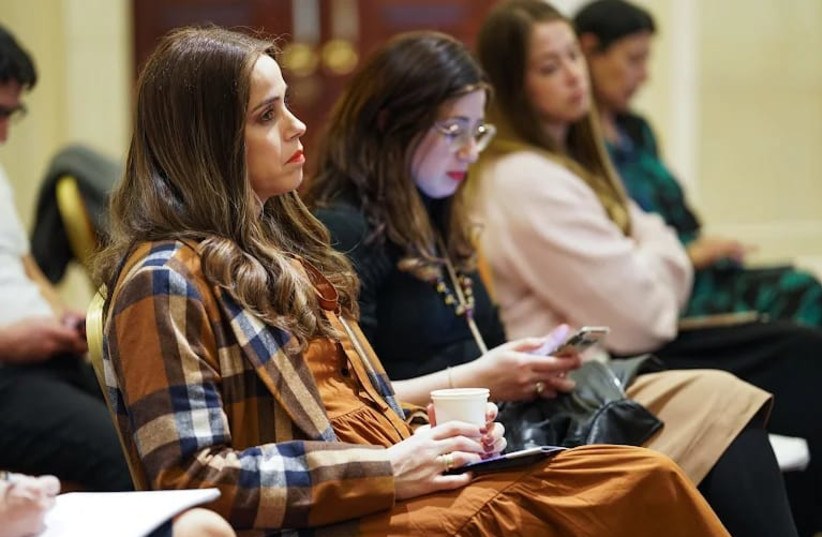A fairly new philanthropic foundation has been established in the past two years and invests close to €4 million annually in Jewish education internationally.
Recently, rabbis and educators from around the world gathered at a special conference dedicated to honoring educators working to integrate religious content for Jewish students attending secular or Christian schools.
They shared techniques, discussed ways to work within government (public) education systems, and dealt with the enormous threat of assimilation.
What is the Yael Foundation and what do they want for Jewish education?
The Yael Foundation is a new foundation, established by Yael Poliavich and her husband, a Jewish couple that lives in Cyprus. Uri Poliavich is a serial tech entrepreneur who has established several companies in the IT and gaming industries.
The foundation's chairman is Rabbi Shmuel Azman, son of Ukraine’s Chief Rabbi Reuven Azman, and its CEO is Eliezer Lesovoy, who formerly worked for the Jewish Agency and other Jewish organizations.

They recently held their first international conference in Paphos, Cyprus. This new foundation provides support and aid for Jewish education and is committed to preserving Judaism in every corner of the world, especially for Jewish children who attend non-Jewish schools.
Community rabbis, school principals and professional educators from 28 countries and five continents attended the conference, during which they participated in lectures and workshops given by veteran educators and professionals.
One of the speakers at the conference was change management coach Idan Bitterman, who gave a workshop on professional development, personal communication styles and ways to properly harness each style to create a productive and effective relationship with students.
The conference also offered TED Talk-style lectures on a wide variety of topics: Rabbi Shmuel Kot, Estonia’s Chief Rabbi, spoke about the complex challenges of a mixed-marriage household and how to bridge the gaps. Elodie Marciano, the founder of a project to transfer children into Jewish education programs in Paris, noted that only a third of Jews in France are educated in Jewish institutions, while the rest attend public, private and Catholic schools. This barrier is not just financial, she said, but is “geographical and psychological” as well.
According to a source at the Yael Foundation, with their assistance, approximately 5,000 children were transferred to a Jewish day school.
Gael Greenwald, deputy chair of the World Zionist Organization and head of its education department, spoke about the importance of “preserving Jewish identity in a world that blurs identities,” by leading a dialogue and strengthening “the connection to the land of Israel.” Greenwald was a partner in the conference as a representative of the World Mizrachi movement.
The conference ended with a gala evening celebrating and honoring the contributions of the many rabbis and Jewish educators around the world, specifically those teaching Jewish children at non-Jewish institutions. Rabbi Mendel Moskovitz, who arrived from the destroyed city of Kharkiv, Ukraine, opened the evening with a video presentation of the Yael Foundation’s extensive activities since it was created in 2020.
Azman said at the gala event that “we find ourselves in the year of Hakhel [a biblical commandment that instructs Jews to all gather once in seven years in order to hear the king read from the Torah], a time that couldn’t be more appropriate for our first conference."
Azman called on those in attendance to “leave the confines to a broader space,” and bring along their institutions and communities. He thanked the founders of the Yael Foundation, its partners and staff, who worked day and night to host a successful conference for the men and women “who do holy work every day” as Jewish educators.
Conference participants were treated to a taste of culture with a special performance by Israeli singer Shuli Rand, who thrilled the audience with his singing and dancing. Between songs, he shared educational insights and stories from his own childhood.
That closing session, which lasted late into the night, dealt with ways to make Jewish education accessible with devotion while under attack. Rabbis from Ukraine shared the hardships they’ve experienced since the start of the war: Students having to leave the classroom, having to deal with tragedies such as a classmate being killed, and how, despite everything, they maintained an educational continuum.
A source in the foundation said that they support Jewish schools of all streams and backgrounds, even though it seems that a majority of the participants at the conference were Orthodox.
